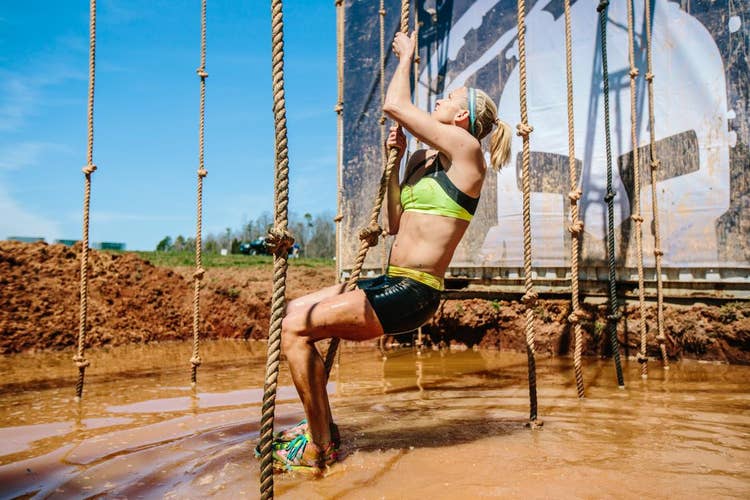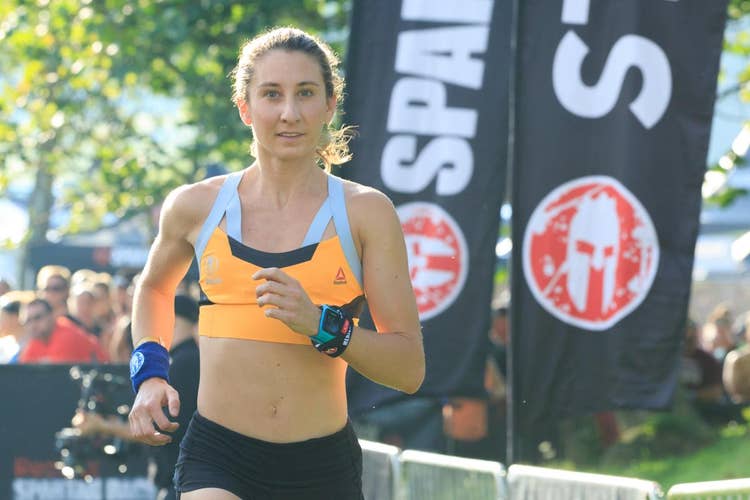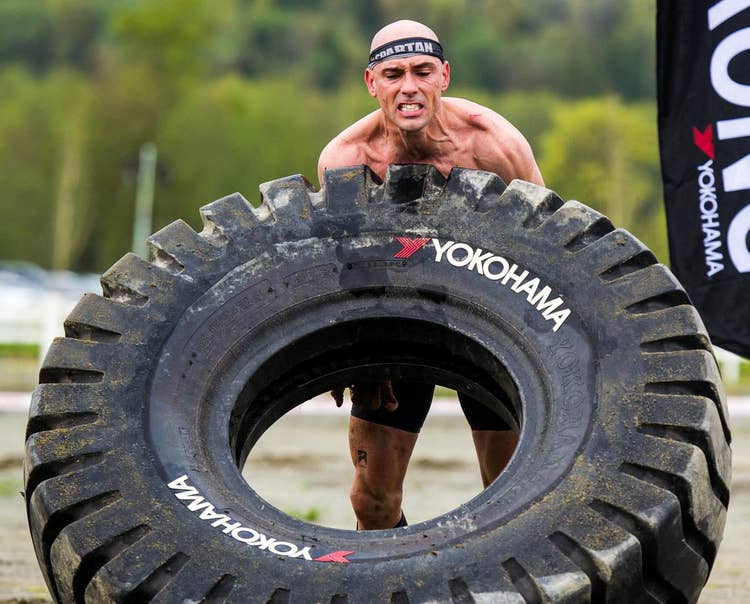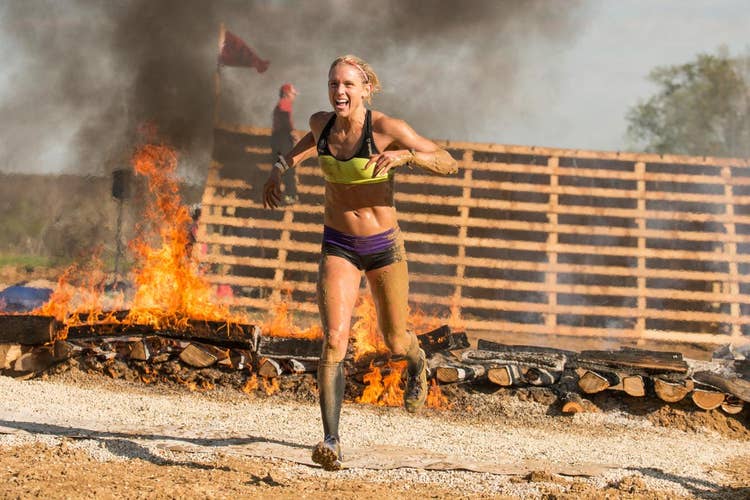Meet Three Spartan Pro Athletes Riding the 24 Hour Fitness 2019 Rose Parade Float

Set your DVRs: The 130th annual Rose Parade takes place in Pasadena, California, on January 1, 2019. This is your chance to ring in the new year with beautifully decorated floral floats and football—including 24 Hour Fitness’ very own Spartan-themed float.
This year’s float celebrates the partnership of 24 Hour Fitness and Spartan, with the theme “Tuned for Any Challenge.” Crafted from more than 45,000 flowers and standing 33 feet in height, the float displays a powerful female Spartan racer as she tunes up mentally and physically for the twists and turns of the parade ahead. Adorned with race obstacles, the float will also feature six of 24 Hour Fitness’ own Spartan SGX trainers and three 24 Hour Fitness–sponsored Spartan pro athletes.
Below, the three Spartan pro athletes riding the float this January share how and why they run Spartan races and how they are “training” for the demands of the Rose Parade.
Meet the athletes



On training for a Spartan Race
NM: I like to take some time the day or so before a race to visualize the event ahead. I’ll look at the race map if it’s available and break it up into sections. I’ll pick out where the last 800, 400 meters of the race are so I know where to push harder. I’ll also identify where the most challenging obstacles are placed. For me, this would be the heavy carry obstacles and the Spear Throw. I try to prepare for the worst-case scenarios and think about how I will react to each of those possibilities. Once I know how I’ll react in each of those situations, I switch to 100 percent positive thinking. I tell myself that I prepared for this race, I’m strong and fast, and I belong here. Physically, I prepare for Spartan races mostly by running and rock climbing. I also try to lift once a week and do something involving heavy carries one time a week, as well. Before races, I’ll typically get a massage about two days before to relax and try to calm my nerves. A glass of wine the night before is always a nice way to calm down, too.
RK: Spartan Race is unlike any other race out there, combining the main three aspects of fitness: speed, strength and endurance. To prepare for the race, you must practice all three disciplines. Even more challenging is that no two races are the same, so being mentally strong to face both the elements and rugged terrain is also a major factor. I prepare for these by training in the Colorado mountains as well as functional-fitness workouts to maintain strength. I often do training races, as well, since there is no real way to recreate a Spartan Race. I emotionally prepare by remembering all the success I’ve had in the past and always taking away positive learning experiences from every race I do. The more races and experience I get helps with confidence and emotional preparation. I also prepare knowing that my family is behind everything I do, and I want to be a good role model for my children.
AB: The beautiful thing about Spartan races is that there is no one perfect way to prepare for them physically. People come in with all different backgrounds, and because Spartan requires you to be such a well-rounded athlete, many different approaches can work. It’s not about absolute strength but relative strength: You need speed, endurance, strength and skill. Running clearly helps (especially trail running), and working on grip strength and heavy carries will benefit you, as well. Mentally and emotionally, expect to be nervous and scared, especially for your first race! It will get tough, and it will hurt, but the more times you put yourself in that uncomfortable place, the easier it gets.
On preparing for the Rose Parade
NM: I’m an extroverted person. I love talking to people and being around big groups, so I think the parade will be exciting. I always enjoy long days that involve working out and walking around town, so I think my daily life has already prepared me well for the parade day. Snacks always help, too! I have a big sweet tooth, and I’m sure I’ll bring some type of treat along to get me through the day.
RK: The demands of a long day at the parade are not to be taken lightly. My military background has taught me that standing for long periods is actually harder than moving. I’m excited there will be some obstacles and ways to move around on the float during the parade. I’ll make sure to pace myself throughout the day and as always stay hydrated and on top of my nutrition because those are things that often get overlooked in the excitement before a major event like this. My biggest strength is endurance, so I’m excited for the challenge of a long day. It’s also always important to prepare for all the elements; no matter where you are, the weather can rapidly change. Gear is so important to any type of sport or even everyday activities. The right shoes with enough support can save you when confined to a restricted space, so I’ll make sure to have some extra cushioned soles. I honestly believe my hardest obstacle will be trying to keep up with my son; he has so much energy, and I’m sure he’ll be super excited!
AB: I’m pretty sure burpees are the answer to everything in the Spartan world. (Kidding.) With any long event, I just try to focus on the atmosphere and the energy of the people around me. Being in the Rose Parade is a once-in-a-lifetime experience, so I will gladly take an overuse elbow injury from waving to the crowds!
Why Spartan?
NM: A friend suggested I try a Spartan Race in the spring of 2016. I was just getting back into trail running after experiencing a career-ending hip injury. I could no longer run on roads or the track, but for some reason, trail running didn’t aggravate my hip injury. With a collegiate running background and a love for rock climbing, I was already prepared for Spartan racing and didn’t even know it! My friend recognized my unique combination of skills and finally convinced me to try a race. I was hesitant at first because I didn’t understand that Spartan racing included elite heats with competitive racers and incredible athletes. I tried my first race in May 2016 and was immediately hooked. I signed up for the rest of the U.S. championship series that Spartan offered that year and set out to compete against the best Spartan racers in North America. I love obstacle-course racing because it combines my love for trail running and fun upper-body challenges, as well. It’s a big kid’s playground with a competitive aspect to the races that I missed after my hip injury made me walk away from road and track racing.
RK: I do Spartan races because I love to test the limits of the human body, and I believe the sport of OCR tests you like nothing else. I come from a military background and am still serving in the special operations community, which for us doing obstacle courses is a daily routine for physical fitness and training for urban combat situations. I was able to make a seamless transition into the sport for this reason. I also love that Spartan always has more to offer. You can start with a Sprint distance and work your way to a Trifecta, go on to the Hurricane Heat, Ultra distance and even 24- to 72-hour events like Agoge. I’m one of very few to complete everything Spartan has to offer and earn the Spartan Perfect Delta. I love the specific races because they are never the same. Even if the race is held at a similar venue, all the obstacles are in different places, and the course we run is often changed, as well. I love that we run through parts of the woods in very technical terrain, making the course sometimes the hardest obstacle, especially when mixed with bad weather. Spartan is now a global race, so there are opportunities to compete all over the world and truly test yourself at the World Championship event in Lake Tahoe each year.
AB: I’m lucky to be one of the original Spartan racers, and it’s incredible to watch the sport of obstacle racing grow over the past eight-plus years. I got started just like so many others out there: I went out to run a race for fun with a group of co-workers, and I got hooked. I love that every race is different and that you have to be such a well-rounded athlete. I truly believe Spartan athletes are some of the best functional athletes out there.
Photo credit: Courtesy of Spartan